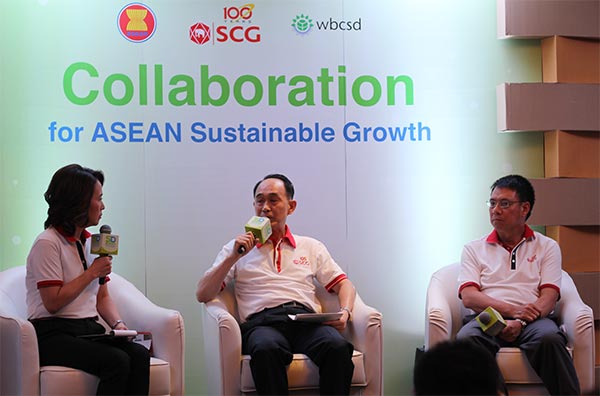ASEAN Sustainable Development Symposium 2014 opens in Bangkok

This event, also held for the fourth year, aims to materialise true sustainability for the entire supply chain while reaching out to establish a network throughout ASEAN to sustain the development for the future with an emphasis that sustainable development is not merely a choice but a compulsory measure for all businesses to sustain further through times.
Kan Trakulhoon, president and CEO of SCG, said that the ASEAN Sustainable Development Symposium 2014 aimed to make a network of sustainability which should lead to a real ‘sustainable development’ throughout the entire process of businesses.
As a venue of information, the symposium hopes to establish a tangible knowledge-based platform for everyone, including the government, the private sector and the financial institutions - from the stock exchange, chambers of commerce, the industrial federations, commercial banks and affiliations of business federations – for further business expansions in ASEAN.
“It is evident that the world population is set to increase to over nine billion within the next 35 years, whereas the natural resources have become ever so limited. More than 200 business leaders around the world had unanimously agreed in the “Vision 2050” that it is mandatory for businesses to make a balance between human economy and natural resources. It is also required that we create and make a better society to live in,” Trakulhoon added. “The sustainable development is then not merely a choice, but a ‘Must Have Agenda’ for all businesses that requires thorough planning and tangible scheming so that we can maintain our business growth and at the same time sustain our limited natural resources and make a good balanced living.”
According to Roongrote Rangsiyopash, chairman of SCG Sustainable Development Committee, SCG has its own sustainable master plan in which they emphasise first and foremost on internal operation before reaching out to the entire production processes – from the supply chain to the end users.
SCG cares to make sure that the group’s procurement is safe for the environment by establishing a ‘Greening the Supply Chain’ standard to ensure its partners’ safety and sustainability measures.
“We need to reform by working together,” said Trakulhoon. “And that does not only mean sharing information, joining each other’s CSR projects, or passing the torch and execute, but to whole-heartedly collaborate with a thorough strategic plan that will become a true force for real sustainability throughout ASEAN in the future.”
What the stars mean:
★ Poor ★ ★ Promising ★★★ Good ★★★★ Very good ★★★★★ Exceptional
Latest News
More News
- PM outlines new tasks for healthcare sector (February 25, 2026 | 16:00)
- Ho Chi Minh City launches plan for innovation and digital transformation (February 25, 2026 | 09:00)
- Vietnam sets ambitious dairy growth targets (February 24, 2026 | 18:00)
- Masan Consumer names new deputy CEO to drive foods and beverages growth (February 23, 2026 | 20:52)
- Myriad risks ahead, but ones Vietnam can confront (February 20, 2026 | 15:02)
- Vietnam making the leap into AI and semiconductors (February 20, 2026 | 09:37)
- Funding must be activated for semiconductor success (February 20, 2026 | 09:20)
- Resilience as new benchmark for smarter infrastructure (February 19, 2026 | 20:35)
- A golden time to shine within ASEAN (February 19, 2026 | 20:22)
- Vietnam’s pivotal year for advancing sustainability (February 19, 2026 | 08:44)
















 Mobile Version
Mobile Version